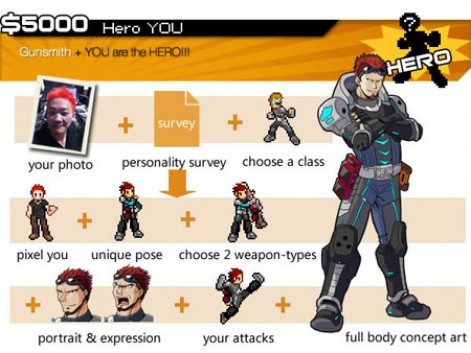With its roots firmly in Canada, it recently established an office in Beijing where it aims to create games for a western audience.
Its latest project, C-Wars, just wrapped up a successful Kickstarter campaign which almost tripled its $32,000 development goal.
Combining turn-based strategy with action RPG elements, and a distinctly retro, pixelated art style C-Wars is undoubtedly a game for core gamers that avoids the current free-to-play model dominating Chinese markets.
We caught up with Loup Zhou, Onipunk's creative director, to talk about what audience he has in mind for C-Wars and where he sees Onipunks heading.
Pocket Gamer: What led you to form Onipunks?
Loup Zhou: ONI means devil or ghost in Japanese. We want to be a strong game developer that makes unique games. It's the passion and love for this industry that made me found the company back in 2009.
Our main focus in game design is to create something different based on the existing game models.
In C-Wars, we take strategy games as the lens, and use RTS and ARPG as the light. When the light goes through the lens, it forms the C-Wars combat system.
Onipunks was founded in Canada. What made you move to Beijing?
The Ottawa office has always been and will always be there. In 2010, I moved back to Beijing, where I was born and raised, because the seed money came from China, and the development cost would be much lower there.
Another main reason is that Louiky Mu, our art director, had just decided to join the team as a full time employee.
When our first game/prototype Crystalides was nominated as the Best Project at GC Asia 2012, we had just finished our ONI-engine.
Which market do you see as your primary: the Chinese Android market or the global mobile gaming market?
Can we say we want both China and the broader west?
Well, we can't be so greedy, so for now, we are aiming for the North American, European, and Japanese markets.
The official carriers system in China is kind of chaotic now, so the global market such as Google Play would be our goal.
Do you feel there are many differences between Chinese and western audiences?
Yes and no. I believe all gamers around the world are the same in a way. They're a special crowd that's fun and passionate about what they love and what we game creators do, which is awesome.
The difference comes from various cultural backgrounds. Unfortunately China isn't the best place for indie game developers yet.
First of all, most players there still adore non-Chinese things much more. Secondly, Chinese players enjoy online games more and the ecosystem was ruined by these aggressive F2P web-based online games.
When I was younger, people were willing to buy a game for $50, no matter where it came from - China, Japan, or the west - but things have changed now.
People prefer to spend money on the F2P modes. I don't blame the Chinese audience for not having enough faith and confidence in Chinese-created games, but I do hope that will change someday.
Why are you looking to release your games in Europe and the west - and what led you to choose your localisation languages?
I lived in France for seven years, and then moved to Canada for my family. I think I know the game world in both China and the west equally well.
However, as I mentioned before, China isn't the best place for us the indie game developers yet. With the censorship and all those political things you have to worry about, the west seems easier for us to aim for.
Also, I'm personally a bit tired of seeing all these Chinese Kung Fu/fairy games, so I wanted to make something different.
Japan has its own unique culture, but developers like Square created the Final Fantasy series that borrowed elements from the west. I think that's very smart, because successfully blending the eastern and western cultures made them more acceptable in both worlds, just like Ang Lee's films.
We want to release our game in China for the Chinese players eventually, but gaining attention from the west is a better way to start.
Why did you choose to do Kickstarter?
It's perhaps the most famous website where you can raise money for incomplete projects, but more importantly, it's one of the best platforms for our game to be tested to see how it's received by players.
We can hear so many valuable voices everyday on Kickstarter, and it's hard to get feedback and suggestions worldwide so quickly and honestly from elsewhere.

Kickstarter is actually cruel in a way, because if you launch your project there and nobody gives a crap about it, it's kind of sad to expose yourself publicly for a month without having any attention.
If they like your project, they donate. If they don't, your confidence is screwed.
We've been very fortunate for having all the support from our lovely backers and honourable indie developer friends from all over the world. We have the best fans ever.
Now, to talk about C-Wars in specific - what was your inspiration for the game and why do you think it will appeal to people?
This immense Luna world we created is actually a bit difficult to be fully presented. We went with roguelike because it's more efficient to directly invite players into and interact with this world.
It's better than a simple RPG because every decision matters. We've been working hard on the C-Wars combat system and we didn't want it to be too complex, but at the same time we did want to be innovative.
That's why we wanted to amplify strategy assets from RTS in a TBS-looking environment.
C-Wars is a core game with permanent death. People may like it because the charm about roguelike is that you can complete the world with the imagination expended from the random encounters.
Also, we provide challenges in our combat system, which is loved among core games.
There are some pronounced similarities between the GC-nominated Crystalides and C-Wars: was Crystalides your prototype for C-Wars, or is C-Wars something different entirely?
The Crystalides project was cancelled at its beta stage. This experimental TBS prototype was 10 times more complex than C-Wars with lots of features and innovations. But at the end, we were worried that the lack of fans would ultimately kill the game.
It was a hard decision, but we had no choice except cancelling it. C-Wars came from the ashes of Crystalides. The combat system was inspired by one module from the Crystalides combat system.
C-Wars and Crystalides share the same worldview but are set in different scenarios. Additionally, C-Wars is a roguelike and open-ended RPG, while Crystalides was an experimental TBS.
There's a distinct, retro focus on pixel art in C-Wars, do you think that will help attract an audience?
We grew up with NES, DOS, GB and WSC. All these old-day games give us a warm feeling. Pixel art is not a dot matrix, it's imagination.
When I stare at a 20 by 20 block of blue pixels and the game tells me, "It's a sapphire" then that little blue dot becomes a magnificent gem. I think that's magical and beautiful.
If we love pixel art this much, there must be some people out there who can share this love with us.
Are you happy to self-publish, or would you consider going to a hardcore publisher in Japan like GREE or DeNA?
C-Wars is a core game, it fits the console market more. Now we are an authorised developer for Nintendo 3DS, so self-publishing would be the way to go.
Besides, it should be fun to learn things in the self-publishing industry.
Thanks to Loup for his time.
You can see what Onipunks gets up to via its website.






















